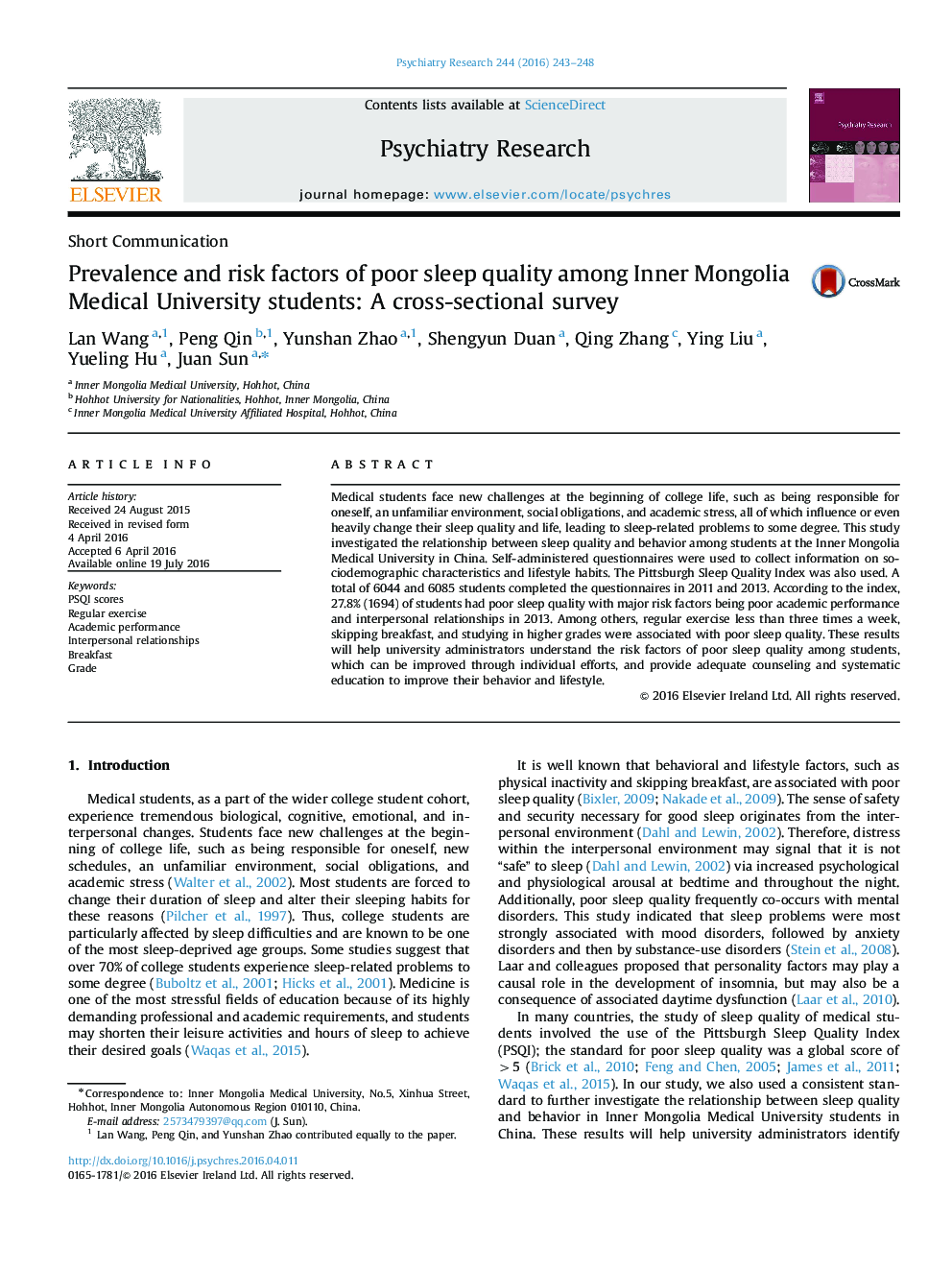| کد مقاله | کد نشریه | سال انتشار | مقاله انگلیسی | نسخه تمام متن |
|---|---|---|---|---|
| 6812586 | 545892 | 2016 | 6 صفحه PDF | دانلود رایگان |
عنوان انگلیسی مقاله ISI
Prevalence and risk factors of poor sleep quality among Inner Mongolia Medical University students: A cross-sectional survey
ترجمه فارسی عنوان
شیوع و عوامل خطر کیفیت خواب ضعیف در بین دانشجویان دانشگاه علوم پزشکی درون مغولی: یک مطالعه مقطعی
دانلود مقاله + سفارش ترجمه
دانلود مقاله ISI انگلیسی
رایگان برای ایرانیان
کلمات کلیدی
ترجمه چکیده
دانشجویان پزشکی در ابتدای زندگی کالج با چالش های جدیدی مواجه می شوند مانند مسئول بودن خود، محیط ناآشنا، تعهدات اجتماعی و استرس تحصیلی، که همه آنها کیفیت زندگی و زندگی خود را تحت تاثیر قرار می دهند یا به شدت تغییر می دهند و منجر به مشکلات خواب می شوند تا حدی. در این مطالعه رابطه بین کیفیت خواب و رفتار دانشجویان در دانشکده پزشکی داخلی مغولستان در چین بررسی شده است. پرسشنامه های خودمراقبت برای جمع آوری اطلاعات در مورد ویژگی های اجتماعی اجتماعی و عادات زندگی شیوه استفاده می شود. شاخص کیفیت خواب پیتسبورگ نیز استفاده شد. در مجموع، 6044 نفر و 6085 دانش آموز، پرسشنامه ها را در سال های 2011 و 2013 تکمیل کردند. طبق این شاخص، 27.8 درصد (1694) دانش آموزان کیفیت خواب ضعیف را با عوامل خطر عمده ای از نظر عملکرد تحصیلی و روابط بین فردی در سال 2013 داشتند. کمتر از سه بار در هفته، صرف صبحانه، و مطالعه در نمرات بالاتر با کیفیت خواب ضعیف همراه بود. این نتایج به مدیران دانشگاه کمک خواهد کرد که عوامل خطرساز کیفیت خواب ضعیف در میان دانش آموزان را درک کنند، که می تواند از طریق تلاش های فردی بهبود یابد و مشاوره و آموزش سیستماتیک مناسب برای بهبود رفتار و شیوه زندگی آنان فراهم شود.
موضوعات مرتبط
علوم زیستی و بیوفناوری
علم عصب شناسی
روانپزشکی بیولوژیکی
چکیده انگلیسی
Medical students face new challenges at the beginning of college life, such as being responsible for oneself, an unfamiliar environment, social obligations, and academic stress, all of which influence or even heavily change their sleep quality and life, leading to sleep-related problems to some degree. This study investigated the relationship between sleep quality and behavior among students at the Inner Mongolia Medical University in China. Self-administered questionnaires were used to collect information on sociodemographic characteristics and lifestyle habits. The Pittsburgh Sleep Quality Index was also used. A total of 6044 and 6085 students completed the questionnaires in 2011 and 2013. According to the index, 27.8% (1694) of students had poor sleep quality with major risk factors being poor academic performance and interpersonal relationships in 2013. Among others, regular exercise less than three times a week, skipping breakfast, and studying in higher grades were associated with poor sleep quality. These results will help university administrators understand the risk factors of poor sleep quality among students, which can be improved through individual efforts, and provide adequate counseling and systematic education to improve their behavior and lifestyle.
ناشر
Database: Elsevier - ScienceDirect (ساینس دایرکت)
Journal: Psychiatry Research - Volume 244, 30 October 2016, Pages 243-248
Journal: Psychiatry Research - Volume 244, 30 October 2016, Pages 243-248
نویسندگان
Lan Wang, Peng Qin, Yunshan Zhao, Shengyun Duan, Qing Zhang, Ying Liu, Yueling Hu, Juan Sun,
